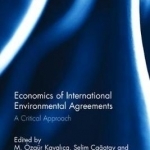Economics of International Environmental Agreements: A Critical Approach
BookThis item doesn’t have any media yet
2017 | Business & Finance
International environmental agreements provide a basis for countries to address ecological problems on a global scale. However, countries are heterogeneous with respect to their economic structures and to the problems relating to the environment that they encounter. Therefore, economic externalities and global environmental conflicts are common and can cause problems in implementation and compliance with international agreements. Economics of International Environmental Agreements illuminates those issues and factors that might cause some countries or firms to take different positions on common problems. This book explores why international environmental agreements deal with some problems successfully but fail with others. The chapters address issues that are global in nature, such as: transboundary pollution, provision of global public goods, individual preferences of inequality- aversion, global cooperation, self-enforcing international environmental agreements, emission standards, abatement costs, environmental quota, technology agreement and adoption and international institutions.
They examine the necessary conditions for the improved performance of international environmental agreements, how cooperation among countries can be improved and the incentives that can be created for voluntary compliance with international environmental agreements. This text is of great importance to academics, students and policy makers who are interested in environmental economics, policy and politics, as well as environmental law.
Related Items:
| Published by | Taylor & Francis Ltd |
| Edition | Unknown |
| ISBN | 9781138650657 |
| Language | N/A |
Images And Data Courtesy Of: Taylor & Francis Ltd.
This content (including text, images, videos and other media) is published and used in accordance
with Fair Use.
